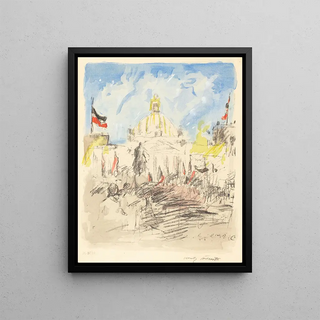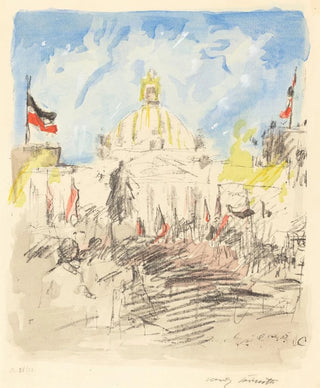Art print | Celebration of Bismarck - Lovis Corinth


View from behind

Frame (optional)
The artwork "Celebration of Bismarck" by Lovis Corinth is a piece that transcends the simple frame of painting to immerse the viewer in an atmosphere charged with stories and emotions. Created at a time when Germany was undergoing profound change, this work serves as a vibrant tribute to Otto von Bismarck, the chancellor who unified the country. The dynamic composition, vivid colors, and richness of detail invite deep contemplation, allowing one to feel the buzz of a historic moment. By immersing oneself in this scene, one discovers not only the artist's technique but also the socio-political context that inspired it.
Style and uniqueness of the work
Lovis Corinth's style is characterized by an expressiveness that is uniquely his own, blending Impressionism and Expressionism in a harmonious dance. In "Celebration of Bismarck," the human figures, though stylized, are imbued with an emotional intensity that captures attention. The faces are animated with vivid passions, illustrating the fervor of Bismarck's supporters. Light plays a crucial role in this piece, creating interplay of shadow and illumination that heightens the drama of the scene. The brushstrokes, both free and controlled, infuse vitality into the whole, making the canvas almost vibrate before the viewer's eyes. This work does not merely depict an event; it lives it and makes it live.
The artist and his influence
Lovis Corinth, born in 1858, is an emblematic figure of early 20th-century German art. His artistic journey, marked by diverse influences ranging from old masters to contemporary movements, allowed him to develop a unique style that profoundly marked his era. Corinth navigated between tradition and modernity, while incorporating elements of daily life and political concerns into his works. His ability to capture the essence of his subjects, whether historical or contemporary, testifies to his exceptional talent. In paying homage to Bismarck, Corinth does not merely celebrate a man; he also evokes the aspirations of a nation seeking identity.

Matte finish

View from behind

Frame (optional)
The artwork "Celebration of Bismarck" by Lovis Corinth is a piece that transcends the simple frame of painting to immerse the viewer in an atmosphere charged with stories and emotions. Created at a time when Germany was undergoing profound change, this work serves as a vibrant tribute to Otto von Bismarck, the chancellor who unified the country. The dynamic composition, vivid colors, and richness of detail invite deep contemplation, allowing one to feel the buzz of a historic moment. By immersing oneself in this scene, one discovers not only the artist's technique but also the socio-political context that inspired it.
Style and uniqueness of the work
Lovis Corinth's style is characterized by an expressiveness that is uniquely his own, blending Impressionism and Expressionism in a harmonious dance. In "Celebration of Bismarck," the human figures, though stylized, are imbued with an emotional intensity that captures attention. The faces are animated with vivid passions, illustrating the fervor of Bismarck's supporters. Light plays a crucial role in this piece, creating interplay of shadow and illumination that heightens the drama of the scene. The brushstrokes, both free and controlled, infuse vitality into the whole, making the canvas almost vibrate before the viewer's eyes. This work does not merely depict an event; it lives it and makes it live.
The artist and his influence
Lovis Corinth, born in 1858, is an emblematic figure of early 20th-century German art. His artistic journey, marked by diverse influences ranging from old masters to contemporary movements, allowed him to develop a unique style that profoundly marked his era. Corinth navigated between tradition and modernity, while incorporating elements of daily life and political concerns into his works. His ability to capture the essence of his subjects, whether historical or contemporary, testifies to his exceptional talent. In paying homage to Bismarck, Corinth does not merely celebrate a man; he also evokes the aspirations of a nation seeking identity.






